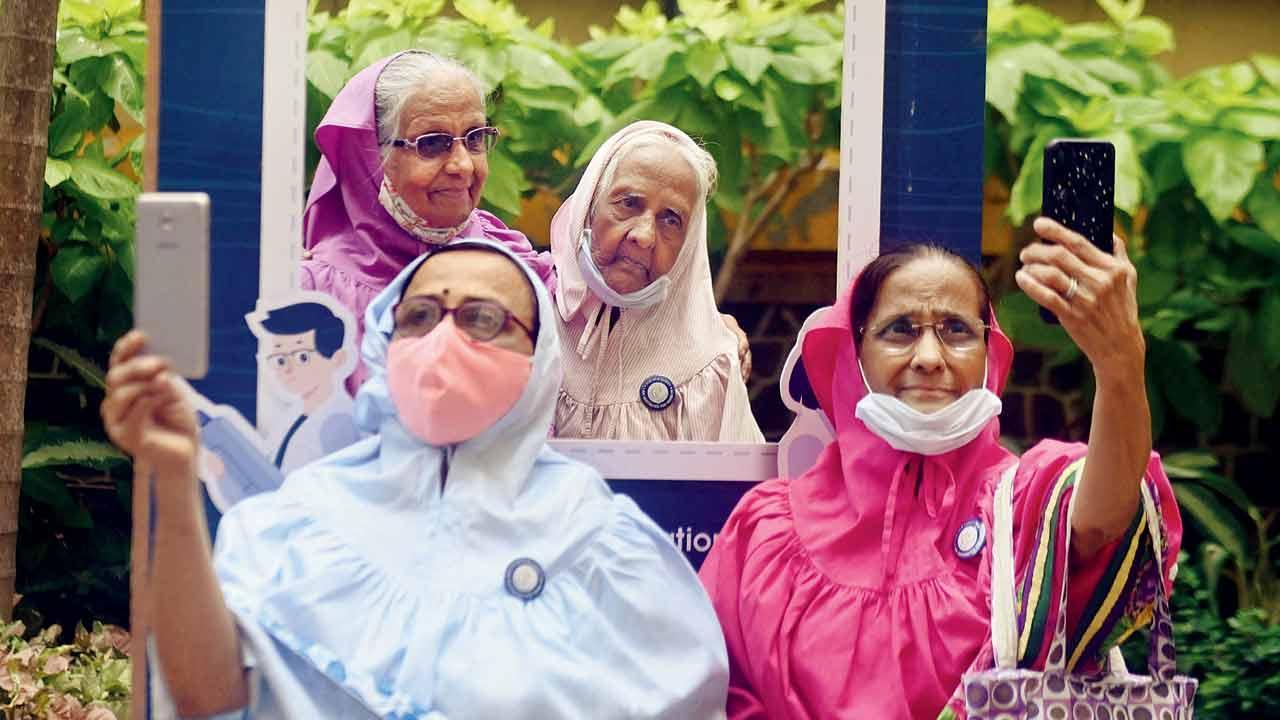With countries pausing the administration of the AstraZeneca vaccine due to worries of clotting, Indian health experts say it will better for people with comorbidities to optimise their condition before taking any vaccine shot

A senior citizen waits in a queue to get vaccinated. Pics/Bipin Kokate
Health experts in India have cautioned those with comorbid conditions opting for the vaccine to first get a thorough health checkup and control their comorbidities. The warning comes as the United Kingdom (UK) and the European Union (EU) temporarily halted the use of the AstraZeneca vaccine which is suspected to have caused clotting of blood in some recipients. Those who have taken the jab have been advised to watch out for discomfort or pain around the calf area.
ADVERTISEMENT
Senior citizens take selfies after getting vaccinated on Tuesday
Dr Ketan Vagholkar, professor of Surgery at D Y Patil Medical College, said, “India needs to proactively monitor similar effects, especially in those with comorbidities. Such instances have not been reported in India so far. But the warning from Europe cannot be ignored.”
Dr Vagholkar added, “It is advisable that those above the age of 45 years who have taken or plan to take the vaccine get a health check-up before taking the jab. The purpose would be to diagnose underlying comorbid ailments. Those who already have comorbid ailments should be optimised (controlling diabetes, blood pressure and heart ailments). Adequate hydration is essential during and post-vaccination. A flu-like illness usually follows the vaccination. This can lead to thrombotic complications in dehydrated individuals. Watch out for pain, swelling in the legs (calf muscles), breathlessness, chest discomfort and headache. Seek medical assistance immediately if symptoms are observed.”
‘Need careful introspection’
Dr. Wiqar Shaikh, professor of Medicine, Grant Medical College and Sir JJ Group of Hospitals, expressed serious concern about the development. Dr. Shaikh emphasised that there are guidelines for administering COVID vaccines. People suffering from allergies, autoimmune disorders (rheumatoid arthritis, SLE), pregnant women, etc. are already exempted from taking the vaccine “Blood clotting is a worrisome side-effect, particularly when it results in death, as has been seen in some vaccine recipients in Europe, and we need to carefully study the decisions taken by European countries before allowing further vaccination by AstraZeneca,” said Dr. Shaikh.
Frontline workers get vaccinated at Nair Hospital. Pic/Ashish Raje
Dr Shaikh said to monitor pain in the calf area followed by breathlessness. “This indicates a blood clot in the leg that can reach the lung causing a pulmonary embolism. It can also travel to any other part of the body. Clotting of blood may take several hours or days post the jab and cannot be ignored,” he said.
Dr Subhash Hira, professor of Global Health at the University of Washington-Seattle, USA, said, “It is not unreasonable to hypothesise that genetic COVID vaccines such as Pfizer and Moderna may also directly infect platelets and lead to autoimmune response resulting in auto-coagulation. It is also known that the adenovirus used as a carrier of ‘S’ and ‘N’ proteins of Coronavirus AstroZaneca vaccine or even the dengue virus itself on its own can stimulate similar auto-immune response leading to a ‘cytokine storm’ causing hyper-coagulation. But it is much safer to get the vaccine to prevent COVID, which causes a cytokine storm in nearly two per cent patients than to worry of clotting due to the vaccine seen in 0.0003 per cent recipients.”
What AstraZeneca says
The company said in a statement, “Across the EU and UK, there have been 15 events of DVT (deep vein thrombosis) and 22 events of pulmonary embolism among those given the vaccine, based on the number of cases the Company has received as of 8 March. In clinical trials, even though the number of thrombotic events was small, these were lower in the vaccinated group. There has also been no evidence of increased bleeding in over 60,000 participants enrolled.”
Ann Taylor, Chief Medical Officer, AstraZeneca, said: “Around 17 million people in the EU and UK have now received our vaccine, and the number of cases of blood clots reported in this group is lower than the hundreds of cases that would be expected among the general population. The nature of the pandemic has led to increased attention in individual cases and we are going beyond the standard practices for safety monitoring of licensed medicines in reporting vaccine events, to ensure public safety.
“Additional testing has, and is, being conducted by ourselves and independently by European health authorities and none of these re-tests have shown cause for concern. During the production of the vaccine, more than 60 quality tests are conducted by AstraZeneca, its partners and by more than 20 independent testing laboratories.
“The Company is keeping this issue under close review but available evidence does not confirm that the vaccine is the cause. To overcome the pandemic, it is important that people get vaccinated.”
17 mn
No. of people in UK and EU who have received the AstraZeneca vaccine
 Subscribe today by clicking the link and stay updated with the latest news!" Click here!
Subscribe today by clicking the link and stay updated with the latest news!" Click here!






